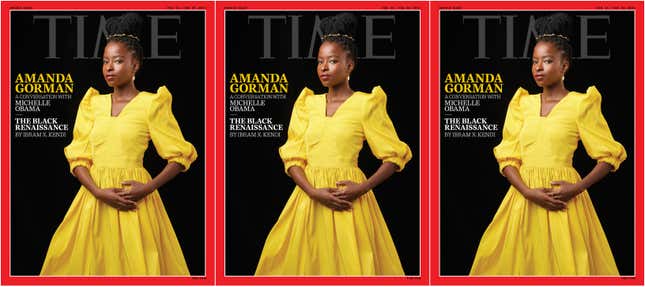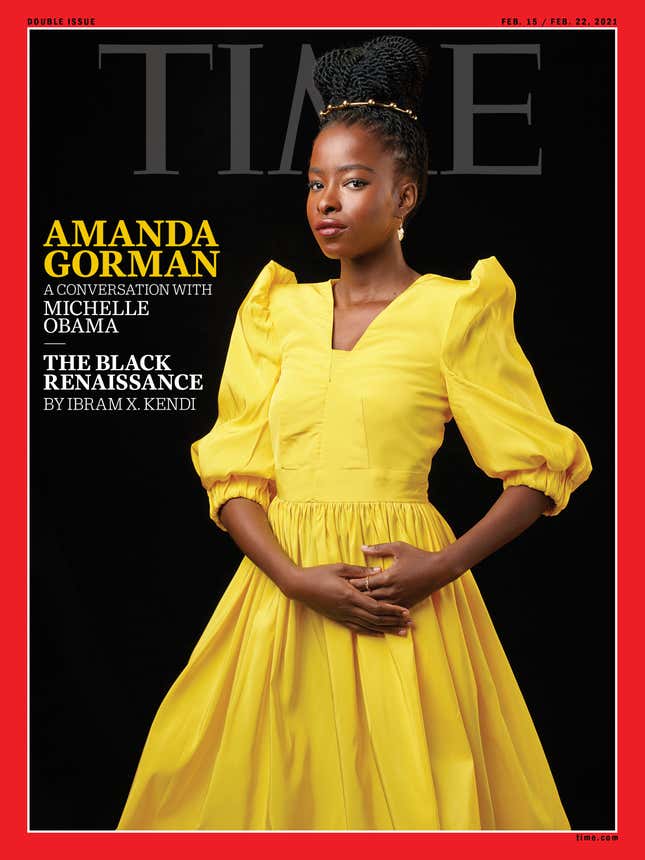
“This Is the Black Renaissance,” the headline above Dr. Ibram X. Kendi’s byline for Time magazine proclaims, at once a manifesto and mantra encapsulating what he (and others) recognize as “the third great cultural revival of Black Americans.” Like the Harlem Renaissance and Black Arts Movement before it, Black creativity is undeniably thriving, asking no permission to exist, nor validation from the white gaze that would prefer us to remain “other.” In this moment, and in spite of everything—or more likely, because of it—Kendi, a 2020 The Root 100 honoree, maintains that we are once again centering ourselves.
In this first Black History Month after the racial reckoning of 2020, I feel impelled to do what historians rarely do: mark history while the story is still being written. We are living in a time when the white gaze remains ever present in American life, but is hardly dominant among today’s assemblage of courageous Black creators. We are living in the time of a new renaissance—what we are calling the Black Renaissance—the third great cultural revival of Black Americans, after the Harlem Renaissance of the 1920s, after the Black Arts Movement of the 1960s and 1970s. Black creators today were nurtured by these past cultural revivals—and all those brilliant creators who sustained Black Arts during the 1980s and 1990s. But if the Harlem Renaissance stirred Black people to see themselves, if the Black Arts Movement stirred Black people to love themselves, then the Black Renaissance is stirring Black people to be themselves. Totally. Unapologetically. Freely.
The article and attendant issue, published in tandem with the start of Black History Month, is a new special project created in partnership with the award-winning historian and author.
“When historian, Time 100 honoree and How to Be an Antiracist author Ibram X. Kendi approached Time with the idea to partner on a project about marking this moment as a Black cultural renaissance, the most challenging question we faced was how to choose which of the innumerable artists and works—across poetry, film, television, music, theater and more—to highlight,” Time Editor-in-Chief and CEO Edward Felsenthal writes in his letter to readers. “This renaissance features works that directly explore the quest for racial justice, as well as art that mines the everyday realities of moving through the world as a Black person—finding the comedy and drama in work, relationships and family.”
Time’s core demographic may not be Black, but Kendi does not shy away from taking his audience to task in its marginalization of Black lives and cultural identity. Pointing to the last six years or so as pivotal in once again demonstrating the power and immense breadth of Black creativity, he writes:
Black novelists, poets, filmmakers, producers, musicians, playwrights, artists and writers got the white judge off our heads. We are no longer focused on making white people comfortable or uncomfortable. We also got the Black judge out of our heads. We refuse to carry the race on our shoulders. We are tired of being race representatives. We’ve escaped the shaming politics of respectability. We are showing that our Black lives have meaning and depth beyond white people.
As a testament, the issue’s cover features inaugural poet Amanda Gorman, photographed on January 29 by artist Awol Erizku, radiant in a yellow gown by Greta Constantine styled by Jason Bolden with makeup by Autumn Moultrie. It is a bounty of Black creativity in a single frame, with its newly crowned ambassador as the centerpiece.

Inside the issue, we are reminded of Gorman’s incandescence with a new recitation of her poem, “The Hill We Climb,” followed by a conversation between the 22-year-old poet and former first lady Michelle Obama, who asks: “What do you make of calling this period a “renaissance”? And where do you see yourself within it?”
“We’re living in an important moment in Black art because we’re living in an important moment in Black life,” Gorman responds. “Whether that’s looking at what it means politically to have an African-American president before Trump, or looking at what it means to have the Black Lives movement become the largest social movement in the United States. What’s been exciting for me is I get to absorb and to live in that creation I see from other African-American artists that I look up to. But then I also get to create art and participate in that historical record…. In all the forms of expression of human life, we’re seeing that artistry be informed by the Black experience. I can’t imagine anything more exciting than that.”
According to a release provided to The Root, other highlights of Time’s Black Renaissance project include a roundtable discussion between acclaimed Black women novelists Brit Bennett (author of The Vanishing Half and a 2017 The Root 100 honoree), Jasmine Guillory (The Proposal) and Jacqueline Woodson (Brown Girl Dreaming) with fellow writer Rebecca Carroll (Surviving the White Gaze: A Memoir) “about the difference between a renaissance and a trend as well as the power of their storytelling.” Elsewhere in the issue, Time staff writers Josiah Bates and Andrew R. Chow “explore how Black creators in film and television are reclaiming aspects of U.S. history—from the Tulsa race massacre to the Black Panthers—that have been misrepresented or omitted entirely in our education system and media,” while Marcus J. Moore, author of The Butterfly Effect: How Kendrick Lamar Ignited the Soul of Black America, reflects on 2016, “the year Black music turned inward.” And Chad Sanders, author of Black Magic, writes about the risk of tokenism and “how, as entertainment companies seek out more and more black stories, creators face a complicated choice.”
Also not to be missed is a list of 25 definitive works from The Black Renaissance (thus far), chosen and curated by a panel of creatives including: Oscar-nominated director Ava DuVernay; Pulitzer Prize-winning playwright Lynn Nottage; National Book Award winner Jesmyn Ward; filmmaker and producer dream hampton; award-winning actor and producer Tessa Thompson; Oscar-winning filmmaker Matthew A. Cherry; authors, comedians and late-night host Desus Nice and The Kid Mero; Kendi and more.
The Black Renaissance issue will be on sale Friday, February 5. That afternoon at 1 pm ET, Time will host a special installment of its virtual leadership series TIME100 Talks (registration is open now). In this episode, guests will discuss the shared reality of being Black in America and how they are working to build a more equitable future,” says the magazine. Featured speakers will include authors Bennett, Carroll, Guillory and Woodson; youth leaders Thandiwe Abdullah, Zanagee Artis, Ose Areghan; producer and director Dawn Porter; singer-songwriter and advocate Andra Day; and fashion designer and Cise founder Blake Van Putten. “

